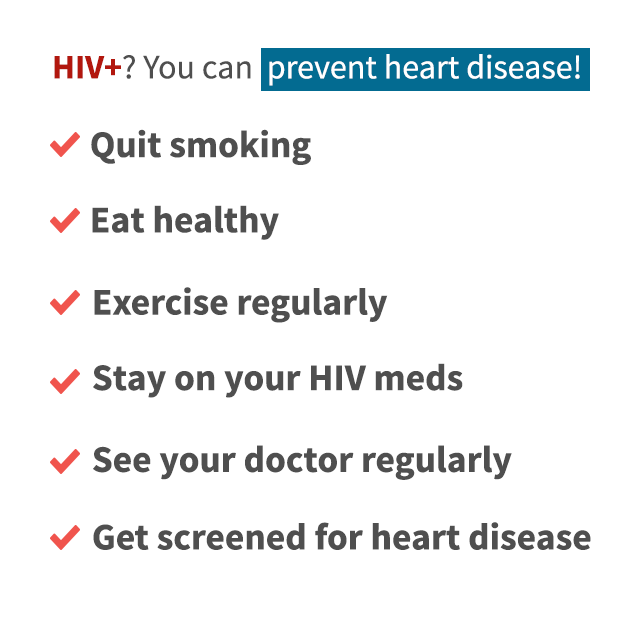Good Heart Health Matters!
Cardiovascular disease—or heart disease—is the leading cause of death in the United States for both men and women. Cardiovascular disease can include many different heart-related issues, including heart attacks, strokes, coronary artery disease, congestive heart failure, and hypertension. Each one of these diseases increases your risk of suffering a disabling health event, such as a major heart attack or stroke, and/or dying prematurely.
Evidence suggests that individuals with HIV have an increased chance of experiencing cardiovascular disease. A number of other factors are proven to increase your risk for cardiovascular disease:
- Age
- High blood cholesterol levels
- High blood pressure
- Diabetes
- Tobacco use
- Diet that is high in saturated fats and sodium
- Physical inactivity
- Obesity
- Alcohol use
- Other substance abuse
- Family history of heart disease
- Depression
For more information about some of these factors, see CDC’s Heart Disease Risk Factors.
HIV and Cardiovascular Disease
Since 1996, when antiretroviral therapy (ART) became available, people living with HIV have been living longer, healthier lives. However, as individuals with HIV age, they are more likely to be diagnosed with chronic illnesses. A growing body of evidence suggests cardiovascular disease in particular is a common occurrence in people over 40 living with HIV. Studies have shown that people living with HIV are 50-100% more likely to develop cardiovascular disease (including heart attack and stroke) than individuals without HIV.
A number of factors combine to put people with HIV at increased risk for cardiovascular disease.
- First, HIV infection itself increases your risk for cardiovascular disease. The virus causes chronic inflammation, which leads to plaque buildup in the arteries that can cause cardiovascular disease.
- Additionally, some antiretroviral medications used to treat HIV can increase your risk for heart disease by causing insulin resistance, and studies have shown that some kinds of HIV meds, including protease inhibitors, are associated with hyperlipidemia—high levels of fat in the blood, including cholesterol and triglycerides. If untreated, this increases the risk heart disease, as well as gall bladder disease, and pancreatitis.
- And finally, the rates of some conventional risk factors for cardiovascular disease, such as smoking, are also higher among people with HIV.
But the benefits of ART have been shown to greatly outweigh the risks, and researchers warn against stopping your HIV meds to protect your heart. In fact, current research shows that stopping and starting HIV meds can make heart disease worse—while putting you in danger of more serious complications by allowing HIV to reproduce in your body.
Researchers are currently pursuing ways to address the problem of cardiovascular disease among people living with HIV. A current large-scale study with research sites throughout the U.S. called the Randomized Trial to Prevent Vascular Events in HIV, or REPRIEVE, is testing whether statin medications, which have been proven safe and effective in reducing cardiovascular disease risk in the general population, can also reduce that risk in people with HIV. And scientists say that newer antiretroviral drugs may be easier on your heart. Ask your healthcare provider what you can do to decrease your risk and to find the best HIV medications for you.
For more information about HIV and heart disease, see POZ’s HIV and Your Heart. ![]()
Prevention is Still the Best Medicine!
You can’t control all of your risk factors for heart disease, but there is a lot you can do to reduce your risk:
- Quit smoking
- Maintain a healthy, low fat diet
- Exercise regularly
- See your health care provider regularly
- Get screened for cardiovascular risk factors
- Stay adherent to your HIV medication and keep your viral load low
For more information, see CDC’s Preventing Heart Disease.
Related Topics on AIDS.gov
Additional Resources
- AIDSInfo – HIV and Hyperlipidemia
- AIDSInfo – HIV and Metabolic Disorders Guide
- AIDSInfo – HIV and Lipodystrophy
- CDC – Heart Disease
- CDC – Division of Heart Disease and Stroke Prevention: Educational Materials for Patients
- CDC – Smoking and HIV
- ClinicalTrials.gov – Randomized Trial to Prevent Vascular Events in HIV (REPRIEVE)
- Healthfinder.gov – Heart Health
- HRSA – Guide for HIV/AIDS Clinical Care: Coronary Heart Disease Risk
- NHLBI – Heart and Vascular Diseases
- Reprieve Trial – Learn More about REPRIEVE

Last revised: 03/19/2016



